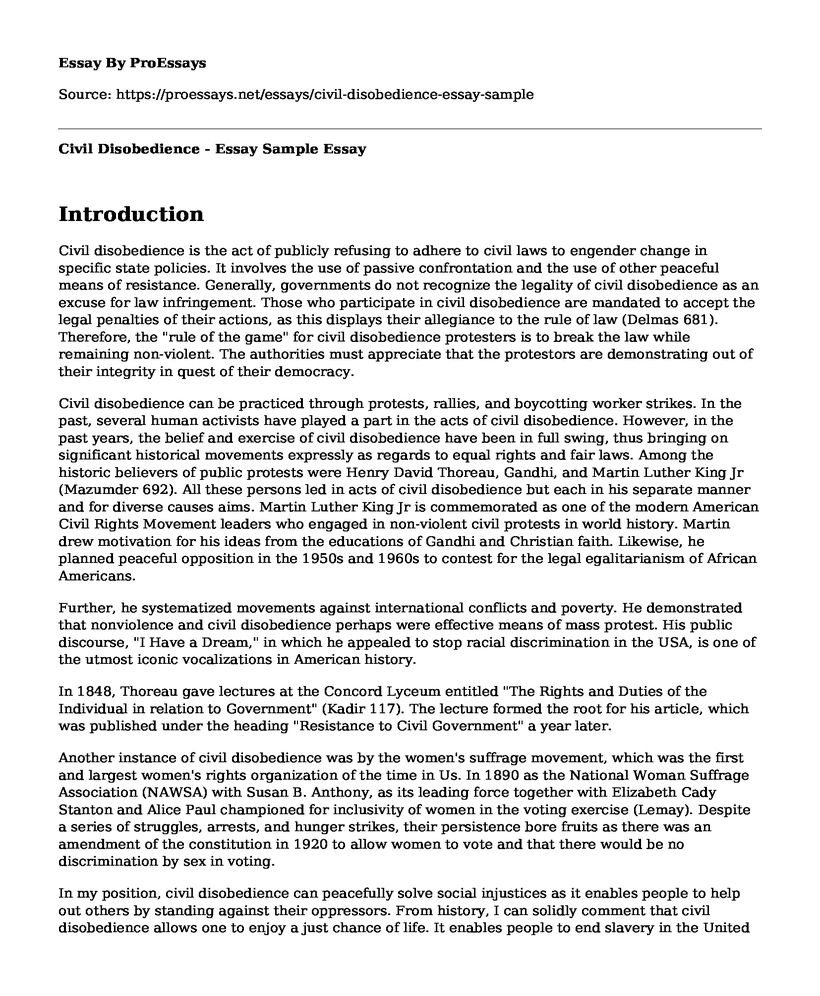Introduction
Civil disobedience is the act of publicly refusing to adhere to civil laws to engender change in specific state policies. It involves the use of passive confrontation and the use of other peaceful means of resistance. Generally, governments do not recognize the legality of civil disobedience as an excuse for law infringement. Those who participate in civil disobedience are mandated to accept the legal penalties of their actions, as this displays their allegiance to the rule of law (Delmas 681). Therefore, the "rule of the game" for civil disobedience protesters is to break the law while remaining non-violent. The authorities must appreciate that the protestors are demonstrating out of their integrity in quest of their democracy.
Civil disobedience can be practiced through protests, rallies, and boycotting worker strikes. In the past, several human activists have played a part in the acts of civil disobedience. However, in the past years, the belief and exercise of civil disobedience have been in full swing, thus bringing on significant historical movements expressly as regards to equal rights and fair laws. Among the historic believers of public protests were Henry David Thoreau, Gandhi, and Martin Luther King Jr (Mazumder 692). All these persons led in acts of civil disobedience but each in his separate manner and for diverse causes aims. Martin Luther King Jr is commemorated as one of the modern American Civil Rights Movement leaders who engaged in non-violent civil protests in world history. Martin drew motivation for his ideas from the educations of Gandhi and Christian faith. Likewise, he planned peaceful opposition in the 1950s and 1960s to contest for the legal egalitarianism of African Americans.
Further, he systematized movements against international conflicts and poverty. He demonstrated that nonviolence and civil disobedience perhaps were effective means of mass protest. His public discourse, "I Have a Dream," in which he appealed to stop racial discrimination in the USA, is one of the utmost iconic vocalizations in American history.
In 1848, Thoreau gave lectures at the Concord Lyceum entitled "The Rights and Duties of the Individual in relation to Government" (Kadir 117). The lecture formed the root for his article, which was published under the heading "Resistance to Civil Government" a year later.
Another instance of civil disobedience was by the women's suffrage movement, which was the first and largest women's rights organization of the time in Us. In 1890 as the National Woman Suffrage Association (NAWSA) with Susan B. Anthony, as its leading force together with Elizabeth Cady Stanton and Alice Paul championed for inclusivity of women in the voting exercise (Lemay). Despite a series of struggles, arrests, and hunger strikes, their persistence bore fruits as there was an amendment of the constitution in 1920 to allow women to vote and that there would be no discrimination by sex in voting.
In my position, civil disobedience can peacefully solve social injustices as it enables people to help out others by standing against their oppressors. From history, I can solidly comment that civil disobedience allows one to enjoy a just chance of life. It enables people to end slavery in the United States. Besides, NAWSA civil disobedience also gave women the right to vote and ended up voter discrimination even in the US.
Works Cited
Delmas, Candice. "Civil Disobedience". Philosophy Compass, vol 11, no. 11, 2016, p. 681. Wiley, doi:10.1111/phc3.12354. Accessed 1 Mar 2020.
Kadir, Djelal. "Agnotology and the Know-Nothing Party: Then and Now." Review of International American Studies 10.1 (2017): 117.
Lemay, Kate Clarke. Votes for Women. Princeton University Press, 2019.
Mazumder, Soumyajit. "The Persistent Effect of U.S. Civil Rights Protests On Political Attitudes". American Journal of Political Science, vol 62, no. 4, 2018, p. 922. Wiley, doi:10.1111/ajps.12384. Accessed 1 Mar 2020.
Cite this page
Civil Disobedience - Essay Sample. (2023, May 19). Retrieved from https://proessays.net/essays/civil-disobedience-essay-sample
If you are the original author of this essay and no longer wish to have it published on the ProEssays website, please click below to request its removal:
- Widening Economic Inequality - Economics Essay Example
- Children Obesity in the United States and Europe
- Paper Example on Gender Inequality in the Society
- Long-Term Effects of Child Molestation Essay Example
- Essay Example on Criminal Justice, Intercultural Prejudice, and Employment Opportunities
- Gang Crime: America's Growing Problem - Essay Sample
- Police Force & Ethics: Examining the Issues of Police Brutality - Essay Sample







